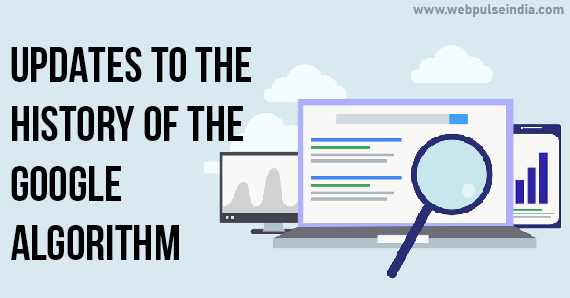
If you want my team to just do your marketing for you, click here.
UPDATES TO THE HISTORY OF THE GOOGLE ALGORITHM

The algorithms used by Google to retrieve material from its search index and offer the best possible results for a query are complex systems. On its search engine results pages, the search engine uses a combination of algorithms and several ranking parameters to offer web pages rated by relevance (SERPs).
Google Algorithms: The algorithms used by Google to retrieve material from its search index and offer the best possible results for a query are complex systems. On its search engine results pages, the search engine uses a combination of algorithms and several ranking parameters to offer web pages rated by relevance (SERPs). In its early years, Google's algorithms were only modified a few times. Every year, Google makes thousands of updates. The majority of these modifications are so tiny that they are barely detected.
Webpulse Solution Pvt Ltd (the SEO Company in Delhi) has prepared a comprehensive list of Google algorithm releases, upgrades, and refreshes over the years, as well as connections to resources for SEO experts interested in learning more about each of these changes. However, the search engine occasionally makes major algorithmic adjustments that have a large impact on the SERPs, such as:
1- Caffeine indexing system: Google announced its new Caffeine indexing method in June 2010. The new indexing technique was designed to help publishers get their material seen more quickly by speeding up search results for users.
It made it much easier for Google to crawl and store data. "Caffeine provides 50% fresher results for web searches than our previous index, and it's the greatest collection of web content we've supplied," Google says. - From Google
This algorithm adjustment was done as part of a larger effort to speed up the internet and satisfy the demands of an ever-increasing internet. To support this overarching objective, Google declared around the same time that site speed would be a Google ranking indication.
Impact on SEO: Although the Caffeine index update did not provide any new ranking factors, it was part of Google's larger "speed up the internet" push, which included the addition of desktop site speed as a new ranking signal and emphasized the importance of website performance. Caffeine improved the user experience by allowing Google to index more stuff on the internet.
2- Panda update (2011): As part of Google's commitment to delivering consumers quality material, the Panda update added a new ranking signal that penalized content farms and keyword stuffing. By recognizing thin, spammy, and low-quality information and deleting it from the top search rankings, improved search results.
Impact on SEO: Many members of the SEO community were forced to adjust their strategies. Black hat SEO practices like keyword stuffing were no longer successful, and SEOs had to adapt by ensuring that content provided genuine value to readers and properly answered search queries.
3- Penguin Update (2012): The Penguin algorithm update was designed to target websites that were using manipulative link-building strategies and had a webspam. It was dubbed the "webspam algorithm update" by Google. As a result of this improvement, the system can now determine if the links pointing back to a specific website are authentic or spam.
Impact on SEO: The Penguin update also targeted black hat SEO practices, which had an impact on SEO. Manipulative link-building strategies were no longer effective, and backlink profiles with a large number of low-quality connections saw a drop in organic traffic and ranks.
4- Hummingbird (2013): The Google Hummingbird algorithm upgrade has a significant impact on the search engine experience. With this change, Google was able to better grasp what we refer to as "search intent." It allowed the search engine to better precisely contextualize user searches and website information and connect the two.
Impact on SEO: Users may more easily find the most appropriate sites to answer their questions after the Hummingbird upgrade. This incentivizes the search community to dig deeper into the search intent behind specific terms and attempt to optimize for it.
5- Pigeon (2013): The Pigeon Google Algorithm Core Update was released in 2013 to boost local search. The pigeon was created to bridge the gap between Google's local search algorithm and Google's web algorithm to improve physical proximity-based ranking criteria.
Impact on SEO: The pigeon upgrade wreaked havoc on the local search community. It enabled small enterprises to contact a local audience more easily. Small businesses may now enhance their chances of ranking by implementing fundamental SEO best practices, such as obtaining backlinks and increasing domain authority. Pigeon has also made it more vital for small businesses to localize their content as local, follow local SEO best practices like acquiring local reviews and use structured data markup to be easily shown in rich results for local queries.


























